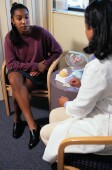- 8 Ways to Increase Dopamine Naturally
- 7 Best Breads for Maintaining Stable Blood Sugar
- Gelatin vs. Collagen: Which is Best for Skin, Nails, and Joints?
- The Long-Term Effects of Daily Turmeric Supplements on Liver Health
- Could Your Grocery Store Meat Be Causing Recurring UTIs?
- Are You Making This Expensive Thermostat Error This Winter?
- Recognizing the Signs of Hypothyroidism
- 10 Strategies to Overcome Insomnia
- Could Artificial Sweeteners Be Aging the Brain Faster?
- Techniques for Soothing Your Nervous System
Childhood Cancer Survivors a Growing Patient Population


Improved treatment of childhood cancer has led to an unprecedented health care problem, with primary care physicians unprepared to care for the special medical needs of adult cancer survivors, researchers report.
A survey of internists — primary care doctors for adults — found that most physicians were not comfortable caring for adult survivors of childhood cancer.
Most also were unfamiliar with the special needs these patients have because of their cancer treatment, according to findings published Jan. 6 in the Annals of Internal Medicine.
For example, only 12 percent of the internists surveyed felt at least “somewhat familiar” with health screening guidelines for childhood cancer survivors.
“These patients need special health care throughout their lifetime, focused on screening and prevention,” said co-author Dr. Tara Henderson, director of the Childhood Cancer Survivors Center at the University of Chicago Medicine Comer Children’s Hospital. “This tells us there’s a gap we need to address to improve the health of these patients.”
In a way, it’s a problem that cancer doctors are happy to have. Back in the 1950s, fewer than half of kids survived childhood cancer, Henderson said. These days, the cure rate is 80 percent or higher.
Currently, more than 350,000 childhood cancer survivors live in the United States, and the number continues to grow, the authors note.
But the treatments that helped save these kids also put them at long-term risk of chronic health problems. For example, chemotherapy or chest radiation treatment can increase a child’s lifetime risk of heart disease.
“We’ve given these patients increased cardiac risk factors, so we need to make sure primary care physicians are paying attention to these patient’s health behaviors and providing the appropriate screening,” Henderson said.
Henderson and her team sent out a survey to which 1,110 general internists responded, asking questions about the care of childhood cancer survivors.
Between 25 percent and 37 percent said they would be at least “somewhat comfortable” caring for a childhood cancer survivor. Their responses varied based on the type of cancer the patient had, the researchers reported.
When asked about screening guidelines for childhood cancer survivors, most physicians did not know the guidelines well enough to make an appropriate recommendation for their patients.
Only 9 percent understood that women exposed to chest radiation as children need annual mammography and breast MRI scans. More than 40 percent said they weren’t sure of the guidelines.
Just 15 percent knew that childhood chemotherapy patients need an echocardiogram every other year to check for heart problems. More than half said they would not proceed with further echocardiograms, and another 19 percent said they weren’t sure of the guidelines.
Part of the problem can be laid at the feet of the pediatric oncologists who saved these kids, Henderson said.
The survey found that nearly three-quarters of internists who have cared for an adult survivor of childhood cancer never received a summary detailing their patient’s cancer treatment.
“We need to be doing a better job as oncologists of transitioning these patients to primary care,” Henderson said.
And these patients do need to be transitioned, she said, adding they are cancer-free and adult, so it makes no sense for them to receive primary care from a pediatric oncologist.
“They have adult issues that need to be cared for by an adult doctor,” Henderson said.
Part of the problem might be the training that general internists receive, said Dr. Jill Ginsberg, director of the Cancer Survivorship Program at the Children’s Hospital of Philadelphia.
They are required to spend part of their residency in an oncology ward, but Ginsberg argues that at least part of that time might be better spent working at a cancer survivor’s program.
“That might be more helpful to their education, because those are the patients they are going to end up taking care of,” said Ginsberg, co-author of an editorial that accompanies the study.
Pediatric oncologists also can help by making sure that patients leave their care armed with the information their adult doctor will need: the type of cancer they had, the treatment received, and the long-term health risks they face.
“Patients should be able to say, ‘This is what I had, this is what I’ve been told, this is what I need to follow,'” Ginsberg said. “As pediatric oncologists, we must teach our patients how to advocate for themselves.”
More information
For more information on health guidelines for childhood cancer survivors, visit the Children’s Oncology Group.
Source: HealthDay
Copyright © 2026 HealthDay. All rights reserved.










